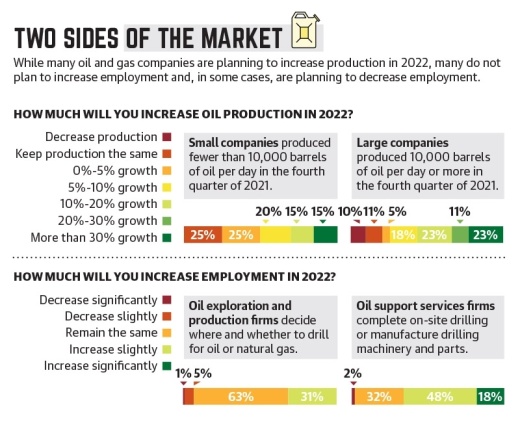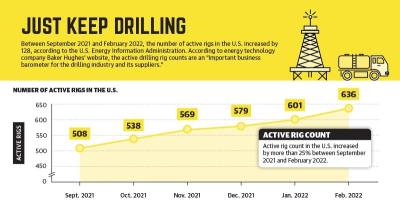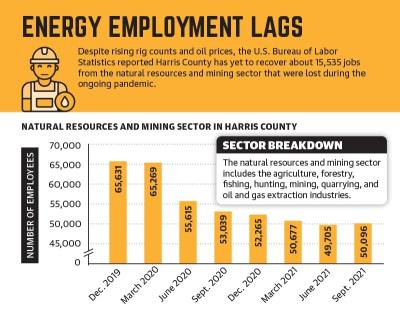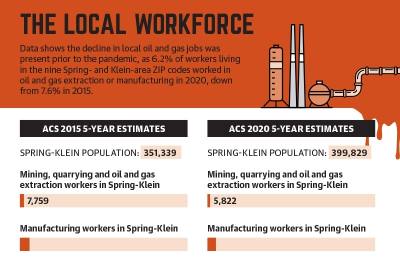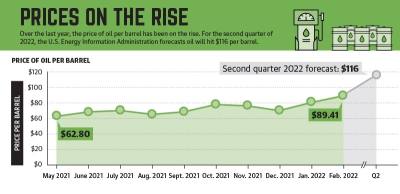According to local leaders, this trend may greatly affect communities such as Spring and Klein, which have a larger manufacturing workforce compared to the rest of the metro area.
U.S. consumers may have seen gas prices rise at the pump in recent months, but Bill Gilmer, director of the University of Houston’s Bauer Institute of Regional Forecasting, said this does not necessarily translate into lasting health for the oil and gas industry.
“Good news: Recovery has occurred in the demand for oil and gas,” Gilmer said in an email. “As people return to work, shopping, travel, etc., they are using gasoline and jet fuel again as daily life resumes. ... The bad news is that despite the progress in oil markets, the response of the U.S. oil industry has been slow and partial.”
Oil and gas jobs have been slow to recover since the initial economic downturn the industry saw due to the pandemic’s onset in March 2020, Gilmer said. Although 90% of total payroll employment has since returned to the Houston metro, 35,500 oil and gas jobs were lost, 10,100 of which have returned.
The northwest portion of the Greater Houston area—which includes Spring and Klein—has a higher percentage of oil and gas-related manufacturing jobs, said Bobby Lieb, president and CEO of the Houston Northwest Chamber of Commerce. According to Lieb, manufacturing accounts for more than 10% of jobs in northwest Houston.
“Oil and gas is ... still a very important sector to our part of the city,” Lieb said. “Manufacturing is ticking back up. It’s the slowest [sector] to recover, but it is ticking back up.”
As the oil and gas industry recovers, ExxonMobil announced Jan. 31 it will be relocating its headquarters to City Place in Spring. The existing 385-acre campus can accommodate up to 10,000 employees and visitors, although the number of employees that will be transferring as part of the move has yet to be announced.
Employment bounces back
As of March 2022, the unemployment rate for the Houston-Sugar Land-Baytown area was 4.4%, according to the U.S. Bureau of Labor Statistics—down from 13.3% in April 2020.
However, the U.S. Bureau of Labor Statistics reported 15,535 fewer Harris County residents worked in the natural resources and mining industry—which includes oil and gas jobs—in September 2021 compared to December 2019.
Locally, data shows the decline was present prior to the pandemic, as 6.2% of workers living in the Spring and Klein area’s nine ZIP codes worked in oil and gas extraction or manufacturing in 2020, down from 7.6% in 2015, according to U.S. Census Bureau data.
Although oil and gas job creation has lagged since the pandemic’s onset, the industry’s market has improved.
Energy technology company Baker Hughes did not respond to a requests for comment, but according to the company’s website, the active drilling rig counts are an “important business barometer for the drilling industry and its suppliers.” As of April 29, the U.S. oil rig count was 698—a year-over-year increase of 258 rigs.
Since this year’s escalation of the Russia-Ukraine war began in February, U.S. gas prices have risen. The war pushed oil prices from about $80.33 per barrel in January to almost $90 per barrel by the end of the month, according to the U.S. Energy Information Administration. For the second quarter of 2022, the EIA expects oil will average at $116 per barrel and gasoline will hit a national average of $4.10 per gallon.
“The $100[-per-barrel] oil price [is] a product partly of a war in Ukraine and partly a failure of the oil industry around the world to invest in new oil and gas production,” Gilmer said.
However, Gilmer noted the increasing oil prices are not factoring into local job growth. Following a crash in 2014, Gilmer said the industry shifted to a new financial model that involves paying dividends to investors instead of diverting revenue to job growth.
Additionally, Lieb noted many companies in the industry have adopted technology to help with profitability, and as a result, not all jobs lost during downturns will return to the industry.
Local energy presence
On Jan. 31, ExxonMobil announced its corporate headquarters will be relocating by mid-2023 to its City Place campus, which was built in 2014.
ExxonMobil did not respond to requests for comment as of press time, but according to the company’s Jan. 31 news release on the decision, the move will “enable closer teamwork to accelerate and increase value delivery through companywide approaches.”
“Our transformed business structure enables us to more fully leverage the corporation’s scale, integration, technology advantages, and the skills and capabilities of our talented workforce to better serve our customers,” ExxonMobil Chair and CEO Darren Woods said in a statement.
As oil and gas workers face a lack of jobs in the industry overall, some companies, such as pipeline maintenance firm Coastal Chemical Co. in Spring, are having a hard time finding qualified candidates, according to Houston Operations Manager Christopher Bugg.
“We are facing a labor shortage, as it is difficult to find people that want to do this work. ... It’s causing a backlog of projects that can’t be completed as scheduled, and some are having to be canceled,” Bugg said.
According to Steven Kahla—the business department dean at Lone Star College-University Park, as automation is added into the oil and gas industry during economic downturns, a lot of companies are also having a hard time getting employees to return.
"You lay somebody off two or three times, and you call them again to come back, and [employees] are like, ‘You know, I found another job; I found something else to do,’” Kahla said.
Other oil and gas corporations that employ thousands in their facilities located in or near the Spring and Klein area include Chevron-owned Noble Energy, Baker Hughes and Southwestern Energy. Those companies did not respond to requests for comment as of press time, but they cited the effects of global challenges on their companies in recent first-quarter 2022 reports.
“As we look ahead to the rest of 2022, we see a favorable oil and gas price backdrop, but also a dynamic operating environment,” said Lorenzo Simonelli, Baker Hughes chairman and CEO, in an April 20 news release. “The recent and unfortunate geopolitical events are exacerbating several trends, including broad-based inflation and supply pressures for key materials, commodities and labor.”
Months to come
In light of potential market uncertainties, many oil and gas companies are hesitant to increase their number of employees in the upcoming year, according to a March energy survey conducted by the Federal Reserve Bank of Dallas.
According to the report—which surveyed 200 oil and gas firms in Texas, New Mexico and Northern Louisiana—63% of oil exploration and production firms intend to keep employment the same for 2022. Meanwhile, 48% of oil and gas support service companies anticipate increasing their employment “slightly.”




